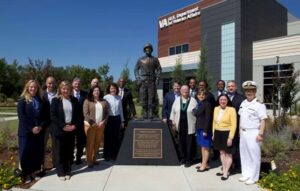
The National Academic Affiliations Council (NAAC) advises the U.S. Department of Veterans Affairs (VA) leadership on all matters affecting relationships between VA and the health professions community. This 14-member council recommends ways to further enhance the largest public-private partnership in VA’s history and a cornerstone of U.S. health professions education. VA photo
WASHINGTON, DC — In an effort to improve healthcare access for veterans in rural, trial and underserved areas across the United States, the VA is creating a new pilot program for graduate medical education.
VA funding will be available for the salaries and benefits of at least 100 physician residents who will rotate to non-VA health care facilities operated by Indian tribes or tribal organizations, the Indian Health Service, the DoD and federally-qualified health centers.
“This program will place physician residents in rural and underserved communities across America, where they’re needed most,” said Chief Academic Affiliations Officer Marjorie Bowman, MD, MPA. “For veterans in those areas, this program will make it easier to access the health care they need and deserve.”
There will be no requirement that the residents or residency programs be in VA facilities.
A request for proposals will go out next summer to solicit the interest of academic institutions and programs participating in the pilot. The selected programs will be paired with interested healthcare facilities to host resident rotations beginning in July 2025.
VA’s Office of Academic Affiliations (OAA) oversees the training of future health professionals for VA and the nation. In fact, nearly 70% of all U.S. physicians have trained in VA healthcare facilities, and more than 118,000 clinicians train at VA each year.
The education and training of healthcare professionals is one of four statutory missions of the VA. The goal is to enhance the quality of and timely access to care provided to veterans within the VHA, but also for others. The landmark 1946 Policy Memorandum No. 2, Title 38 U.S.C. Section 7302 mandates that VA assist in carrying out a “program of education and training of health personnel” for its own needs and those of the nation.
In pursuit of that, the VA has conducted health professions education and training in partnership with affiliated U.S. academic institutions for the past 75 years.
This mandate “spurred the significant growth in the depth and breadth of health professions education in the VA, which is now the largest provider of health professions education and training and second-largest funder of graduate medical education in the United States,” according to the OAA.
The mission currently involves four areas: medical and dental education, nursing education, associated health education and advanced fellowships.
VA’s physician education program is conducted in collaboration with 153 allopathic medical schools and all osteopathic medical schools. Overall, more than 1,800 educational institutions work with the VA on education and training.
Last year, the Association of American Medical Colleges sent a letter to Congress noting, “The VA is an irreplaceable component of the U.S. medical education and research enterprises. The more than 75-year-old relationship between the VA and academic medicine dates to the end of World War II, when the VA faced a severe shortage of physicians as nearly 16 million men and women returned from overseas. At the same time, many physicians were returning from the war without having completed residency training.”
The letter adds, “what started as a simple idea in a time of great need has developed into an unprecedented public-private partnership. Today, 99% of medical schools are affiliated with a VA medical center and training programs are available at 90% of VA facilities. Through these affiliations, the VA provides clinical experiences to approximately 75,000 medical students and residents each year.”
The AAMC endorsed the expansion of graduate medical education (GME) and clinical training opportunities within the VA and said it supported the proposal to provide $268 million in the Build Back Better Act for 500 new VA GME positions over 7 years.
